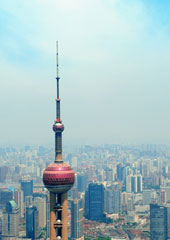Reforming China — From Beyond Its Borders
Where in the world are Chinese leaders looking for inspiration to improve China’s future?
February 4, 2013

Whoever wants to understand China’s options must begin with the four Chinese societies that are not directly ruled by the Chinese Communist Party — Singapore, Taiwan, Hong Kong and Macao.
The latter two are now parts of China, but they retain their own judicial system and governmental arrangements. These have proven quite resistant to attempts by the People’s Republic to change them.
Singapore is, of course, an independent multiethnic state, located far away from China, but with a majority Chinese-ancestry population. Taiwan is a democratic Chinese republic, located right off the mainland of China, which — by an accident of history — has been independent of the People’s Republic for sixty years.
All of these are Chinese states — and they are always at the core of Chinese thinking about the future of the People’s Republic.
The People’s Republic is in need of ideas on good governance, and its leading men and women believe that they can get such ideas from other Chinese, as rulers in Beijing have so often done in the past.
The advice given by those who look at the Chinese world outside China goes in very different directions. Those who stress the need for elite control, usually point to Singapore and its experience under Lee Kwan Yew.
Singapore is today a very well-regulated society with authoritarian traits. Many Chinese who go there from the People’s Republic often remark in astonishment, if it is their first visit, on how much better it works as a model for stability and organization than China does.
Lee and his men got much right — not least in poverty alleviation and growth economics, but also in planning for the future. Singapore’s sovereign wealth funds are the envy of the world.
But Singapore is a city state, no easy model for a country that contains a fifth of humanity. Singapore therefore is an ideal for some within the Chinese Communist Party, but not a reality that is easily adhered to.
And even if the Lion City today — with its ban on chewing gum and its “managed” democracy — shocks many Westerners with its censoriousness, it is still far more liberal than the People’s Republic. There, people are executed for what in Singapore would lead to a stiff fine and debates are utterly suppressed that would not raise a wrinkle in Singapore today.
Hong Kong and Macao are the strange cases, colonial remnants within China itself, though they were taken over by the mainland with much fanfare in 1997 and 1999, respectively.
But takeover did not mean political and juridical subjugation. Beijing was very aware that Hong Kong, especially, was the hen that laid the golden eggs.
Hong Kong connected trade and industry, above all in south China, with international markets. Its British colonial justice and order was conducive to its role as a center for finance that contributed to China’s growth.
Beijing is less enamored by the traces of democracy that the British attempted to add to their colony almost as an afterthought in the 1990s, after they had negotiated its return to China.
The mainland has been eager to avoid a furthering of political pluralism in Hong Kong. But the Communists have respected the former colony’s unique position as a city that, in essence, is ruled by English common law within the borders of a communist state.
According to the U.S. State Department, as of 2011, “Hong Kong remains a free and open society where human rights are respected, courts are independent, and there is well-established respect for the rule of law.”
Although Shanghai is moving to become the commercial capital of China, Hong Kong is likely to retain much of its position because of its laws, its good administration and its relative freedom of speech. At the moment of my writing, the market capitalization of the two is about equal. Their stock exchanges rank fifth and sixth in the world, respectively.
The big comparison for China, however, is none of these former colonies, but Taiwan. The rump Republic of China, situated a hundred miles from the mainland coast, has a population that is almost fully Chinese, enjoys high income levels, social stability and a democratic form of government.
Many people — both on the mainland and on the island — are hoping for some form of slow, peaceful integration of the two sides. But it is highly unlikely that the people on Taiwan would be willing to give up their own good institutions, developed through two generations of struggle, in return for some form of reunification with the mainland.
On the contrary, more and more people in China are looking to Taiwan for inspiration in how to reform corrupt, unresponsive and laggard institutions on the mainland.
As increasing numbers of people from the mainland get the chance to visit the island, they will be struck by the massive qualitative differences between public administration there and at home, not to mention by the full freedom of speech that exists on Taiwan.
Some will still claim that Taiwan is an American colony, or contend that China is too big to take over models that may fit one small island. There are even those who are venturesome (and brave) enough to say that the different traditions Taiwan took up during Japanese colonial rule lay the foundations for a different development today, one that China cannot easily copy.
But increasingly, these will become small groups compared to the many who will be wondering why China, with all its resources — human and economic — cannot deliver what the Taiwan government can give its population.
High levels of individual freedom and political pluralism are some of the main aspects of what Chinese today see when they look at how other Chinese live outside the People’s Republic.
They also see stable, well-organized societies of the sort that they wish for in China, after all the chaos of the past four generations. The mainland government is trying to tell them that if they do not stick with the Communist Party, the alternative is disorder.
But, when the Chinese look at Chinese-run states elsewhere, it is not far-fetched for citizens of the People’s Republic to conclude that theirs is the chaotic state, with a predatory market system, laws that cannot be enforced and rules of behavior that change on the whim of the government.
Listening to some young people in Beijing discussing the arrest and imprisonment of a former Taiwan president on charges of embezzlement and corruption, I heard only a few who felt that Chen Shui-bian’s arrest was a sign of things going badly on Taiwan.
Most were marveling at a society and a state where such measures were possible against the high and mighty.
Editor’s note: This essay is adapted from Restless Empire: China and the World Since 1750 (Basic Books) by Odd Arne Westad. Published by arrangement with the author. Copyright © 2012 by Odd Arne Westad.
Takeaways
The People's Republic is in need of ideas on good governance and China's leaders believe that they can get such ideas from other Chinese.
The two Chinese societies that play a particularly important role, but are not directly ruled by the CCP are Singapore and Taiwan.
More and more people in China are looking to Taiwan for inspiration in how to reform corrupt, unresponsive and laggard institutions on the mainland.
The main thing the Chinese see when they look at how other Chinese live outside the People's Republic is their individual freedom and political pluralism.
Singapore is a city-state, no easy model for China, a country that contains a fifth of humanity.
Read previous
Where Do Poor Americans Rank Globally?
February 2, 2013
